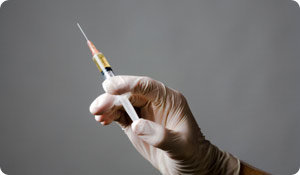
Numerous prostate cancer vaccines are in development and in various stages of clinical trials. A clinical trial is a rigorous scientific study of a potential therapy using human subjects. Clinical trials begin after scientists have accumulated enough data in lab studies to believe the therapy will be effective and not cause undue harm.
The effectiveness of cancer vaccines under development have improved significantly. Scientists are developing effective ways to deliver vaccines and combing vaccines with other immune system therapies seems to enhance the overall immune response. They've also identified characteristics of tumor-associated antigens, or markers that allow antibodies to recognize foreign invaders, leading to further improvements in vaccine research.
Prostate cancer vaccines, in particular, are advancing rapidly. This cancer often grows slowly, allowing vaccines sufficient time to generate an immune response. Furthermore, prostate cancer antigens direct the immune system to respond specifically to prostate cancer cells, sparing healthy tissue.
Here are updates on current prostate cancer vaccine activity.
- The Food and Drug Administration approved a prostate cancer vaccine called Provenge, after the results of clinical trials provided evidence it prolonged men's lives on average four months and increased the three-year survival rate by 38 percent.
- The potential vaccine POSTVAC-VF is in clinical trials. POSTVAC-VF increased mean overall survival rates for men by eight months more than men who took a placebo. Scientists developed this vaccine based on the theory that the immune system fights cancer by directing it to attack specific targets on cells called Tumor Associated Antigens.
- Currently, scientists are studying the potential of engineered measles viruses as a prostate cancer vaccine. In preliminary lab studies, they've found engineered measles viruses can effectively infect, replicate in and kill prostate cancer cells. When researchers inject the virus directly into tumors, it significantly delays tumor growth.
- Researchers are studying whether vaccines combined with hormone (androgen) deprivation therapy helps preventing recurrence by strengthening the patient's own immune system against prostate cancer. The vaccine may work by priming the immune system so when physicians add the hormone treatment, the vaccine is more effective.
You can visit www.clinicaltrials.gov to see what prostate cancer clinical trials are currently recruiting participants.
Sources
http://www.cancer.gov/newscenter/pressreleases/ProstateHormoneVaccine
http://advancedprostatecancer.net/?cat=398
http://www.ncbi.nlm.nih.gov/pubmed/18345705?ordinalpos=1&itool=EntrezSystem2.PEntrez.Pubmed.Pubmed_ResultsPanel.Pubmed_DiscoveryPanel.Pubmed_Discovery_RA&linkpos=4&log$=relatedreviews&logdbfrom=pubmedhttp://www.ncbi.nlm.nih.gov/pubmed/19773744?ordinalpos=1&itool=EntrezSystem2.PEntrez.Pubmed.Pubmed_ResultsPanel.Pubmed_DefaultReportPanel.Pubmed_RVDocSum
http://www.ncbi.nlm.nih.gov/pubmed/18973133?ordinalpos=1&itool=EntrezSystem2.PEntrez.Pubmed.Pubmed_ResultsPanel.Pubmed_DiscoveryPanel.Pubmed_Discovery_RA&linkpos=2&log$=relatedarticles&logdbfrom=pubmedhttp://www.ncbi.nlm.nih.gov/pubmed/19719454?ordinalpos=5&itool=EntrezSystem2.PEntrez.Pubmed.Pubmed_ResultsPanel.Pubmed_DefaultReportPanel.Pubmed_RVDocSum





